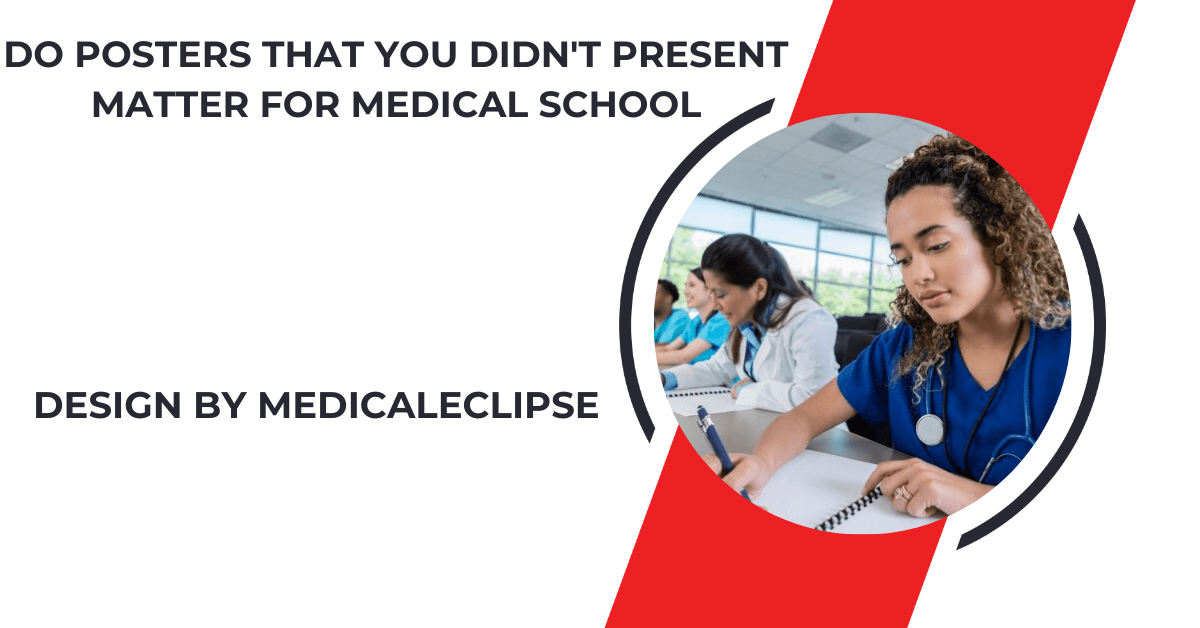Yes, posters that you didn’t present still matter for medical school applications. They reflect your engagement in research, teamwork, and valuable skill development, which are important qualities for aspiring medical students.
In this article, we’ll explore the significance of posters that you didn’t present for medical school applications. Understanding their impact can help you effectively showcase your research experience and dedication to the field.
Understanding the Importance of Research in Medical School Applications:

Research experience is essential for aspiring medical students. It demonstrates a commitment to the field, analytical skills, and the ability to engage in scientific inquiry. Medical schools are increasingly looking for candidates who can think critically and apply their knowledge in practical settings. Participating in research, even if it doesn’t lead to a formal presentation, can indicate a strong foundation in these areas.
Posters vs. Presentations: What’s the Difference?
When discussing research dissemination, posters and presentations serve different purposes. Posters visually summarize research, while presentations allow for direct engagement with an audience. Both formats contribute uniquely to sharing findings.
- Posters: These are visual representations of research, typically displayed at conferences. They summarize research questions, methodologies, results, and conclusions. Posters are often a part of larger academic gatherings where multiple researchers showcase their work.
- Presentations: These involve speaking about your research in front of an audience, often accompanied by slides. Presentations allow for direct interaction and questions from the audience, making them a more personal and engaging way to communicate your findings.
While both formats are valuable, presenting your research often leaves a more significant impact because it showcases not only your research skills but also your ability to communicate effectively.
The Value of Non-Presented Posters:
Even if you didn’t present a poster, it can still be valuable for your medical school application. It demonstrates your involvement in research and showcases your skills. Here are a few reasons why it matters:
- Demonstration of Research Engagement: Having a poster, even if not presented, indicates that you were actively engaged in research. It shows that you participated in the research process and contributed to the findings, which reflects well on your initiative and commitment to learning.
- Contribution to Collaborative Work: Many research projects involve teamwork. A poster that you worked on collaboratively highlights your ability to work with others and your contributions to a group effort. Admissions committees value teamwork, as medicine is a highly collaborative field.
- Skill Development: Creating a poster involves skills such as summarizing complex information, designing visual content, and understanding the nuances of your research. These skills are transferable to medical school and your future career as a physician.
- Potential for Future Presentation: Just because you didn’t present the poster at the time doesn’t mean it can’t be presented later. If you have the opportunity to present the work in the future, it can enhance your application further.
- Reflection of Broader Interests: If your poster explores topics outside the traditional medical field—such as public health, ethics, or community health—it may demonstrate your broader interests and a well-rounded perspective. This can be appealing to admissions committees looking for diverse applicants.
Also Read: Are Medical Schools Checking if You Use AI – Are They Watching?!
How to Present Your Research Experience in Applications:
When preparing your medical school application, effectively highlight your research experiences to showcase your skills and commitment. Include all relevant projects and emphasize your contributions and learning outcomes for a stronger narrative.
- Include All Relevant Research: In your application, list all research projects, including those that led to posters, whether or not they were presented. Describe your specific contributions, methodologies used, and outcomes of the research.
- Emphasize Learning Outcomes: Discuss what you learned from the experience, both in terms of research skills and personal growth. Highlighting your ability to learn from both successes and challenges can strengthen your narrative.
- Mention Future Plans: If you plan to present your non-presented posters at future conferences or have the potential for publication, mention these in your application. This shows your ongoing commitment to research and scholarship.
Impact on Personal Statement:
Non-presented posters can provide meaningful content for your personal statement. Discussing your research experience, even if not formally presented, allows you to reflect on your intellectual curiosity and how these experiences shape your motivation for pursuing medicine, adding depth to your application narrative.
Networking Opportunities:

Even if you didn’t present your poster, the process of creating it and participating in conferences can provide valuable networking opportunities. Engaging with peers and professionals in your field can lead to mentorship or collaborative research opportunities in the future, which can be beneficial for your medical school application.
Demonstration of Commitment to Continuous Learning:
Having non-presented posters showcases your dedication to continuous learning and exploration in your field. It reflects your willingness to delve into research topics and contribute to the scientific community, qualities that medical schools highly value in prospective students.
FAQ’s
1.Do non-presented posters hold value for medical school applications?
Yes, they demonstrate your engagement in research and commitment to learning. They reflect your ability to work collaboratively and develop essential skills.
2.What distinguishes a poster from a presentation?
Posters are visual summaries displayed at conferences, while presentations involve speaking about research to an audience. Presentations allow for more interaction and personal engagement.
3.How do non-presented posters show teamwork?
They highlight your contributions to collaborative research projects, showcasing your ability to work effectively with others. Teamwork is crucial in the medical field.
4.What skills can be developed by creating a poster?
Creating a poster enhances skills in summarizing complex information, designing visuals, and understanding research nuances. These skills are valuable in medical school and beyond.
5.Can non-presented posters be presented later?
Yes, if opportunities arise, you can present them at future conferences. Doing so can further enhance your application and demonstrate your ongoing research commitment.
6.Should I include non-presented posters in my application?
Absolutely! List all research projects, including non-presented posters, and describe your contributions and learning outcomes. This helps strengthen your overall application narrative.
Conclusion
In summary, posters that you didn’t present do matter for medical school applications. While presented posters may carry more weight due to their visibility and direct engagement, non-presented posters still indicate your involvement in research, teamwork, and the development of valuable skills. By effectively highlighting your research experiences and the insights gained, you can strengthen your application and demonstrate your readiness for the challenges of medical school. Ultimately, every piece of your application counts, and your research journey is an integral part of your path toward becoming a physician.
Related Post
- What Is Medicaid Exclusion For Funeral Plans – Benefits of Medicaid Funeral Exclusions!
- Banner Desert Medical Center – Trusted Care in Arizona!
- Why Cranberry Femine Health – The Ultimate Natural Wellness Guide for Women!
- What Is The Best Peptide For Bone Health – A Comprehensive Overview!
- Why Is Signify Health Calling Me – Understanding the Purpose Behind the Call!

Leave a Reply